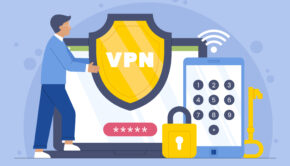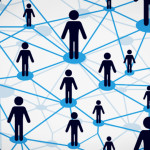Digital surveillance is a fact of life, it is time to make privacy a human right
People close their doors when they want to sleep; some close their bedroom curtains when they want to change. You meet your doctor behind closed doors; you count your money in secret.
Well, all that is “privacy,” but there is a more significant threat currently on the scene. Digital surveillance has become a rising trend worldwide, and the sheer number of digital privacy violations is enormous.
Without digital privacy, millions of people can see everything you hide information leak occurs. The threat of digital surveillance has immensely skyrocketed, but people do not understand what it entails and the flawed privacy law.
Ali Qamar, the consumer privacy champion and editor at Privacy Savvy, an education platform dedicated to informing users about best internet privacy practices, defeating censorship, unblocking restricted content, and securing your devices, had the following to say about it:
“Users’ privacy is at extreme risk in this digital technology age. And, surveillance is clearly a threat to human rights today. Governments must take action by deploying vigorous data protection laws, and ideally, introducing some Big Tech regulatory measures. In particular, administrations must pass some legislation to prevent tech giants (especially Facebook and Google) from requiring “consent” to user data collection and processing in exchange of accessing their services.”
What is digital surveillance?
In recent years Government and criminal organizations around the world have doubled up surveillance mechanisms. IT and Telecom companies are under obligation to hand over user’s information to Government and security agencies.
Hackers and malicious programs have also ramped up their surveillance systems to steal sensitive information from people. What about tech companies and marketing firms? Big companies like Facebook, Google, and Microsoft makes money through advertising.
They deploy tools and systems to gather user’s information and customize marketing ads. At the same time, other organizations steal users’ data and sell them for financial rewards. Internet service providers are not innocent, either. They carry out mass surveillance to see what you see, they see what you do, and they keep a tab of your every move. Unfortunately for internet users, surveillance has become a way of life.
How do you protect yourself against surveillance? Privacy is a fundamental human right that everybody must respect. But unfortunately, security agencies have become prominent perpetrators. Therefore internet users must find multifaceted ways to protect their information against surveillance.
Article 1
Article 1 states that all humans are born equal and free in rights and dignity. Everyone is entitled to their conscience, preferred reason pattern, which others must respect in the spirit of love and brotherhood.
Unfortunately, Government agencies do not respect article 1. There are secret laws all around the world that require Internet companies to save users’ information for two or more years. Such information may include who you call, what you browse, where you accessed the internet or made the call, and so much more. The Government and security agencies stores and use this information.
Unlike the truth, tech companies claim to respect user’s privacy, likewise the Government. No agency has come out to state that they carry out surveillance of internet users publicly. But behind the scene, they carry out the mass harvest of information. This is against the fundamental human rights of people.
Government agencies carry out mass surveillance against the opposition, ethnic minority, and other random targets. Surveillance is carried out through the apps you download, your network traffic, home appliances, and gadgets.
Some of those applications turn on your location, which enables them to know your location, where you live, work, etc. ISPs tracks your internet and see what you do. Your phone network providers also violate users by tracking them. It does not matter if you make a call or not; they can know your location by pinging your nearest phone tower.
Article 3
Every human has an absolute right to their privacy irrespective of their affiliation, religion, race, color or language, etc. IT companies and Government agencies violate this right through various targeted means. They carry out surveillance through appliances, cars, your internet, cell towers, email, phone records, and so much more.
They monitor computer activities and data stored on the cloud, on your device, hard drive, and so on. Some Surveillance systems have been unfairly legalized, and they do not need any form of authorization before execution. Criminal organizations also carry out mass surveillance on internet users.
Article 7
Everyone is entitled to equal protection before the law. No one should be discriminated against, violated, or unjustly treated/incited.
Surveillance has allowed Government agencies and securities firms to violate this law. Agencies are allowed to present false evidence in the courtroom to indict whoever they want. A lot of unfair acts have been enacted in the USA to enable the Government and security agencies to present wiretapping evidence.
For example, if not for the Patriot Act, warrantless wiretapping would be dismissed in the courtroom. The patriot act allows the Government to violate people and parties they deem as enemies. They violate people’s privacy and also hold them unjustly accountable by the law.
Article 12
Article 12 states that every citizen has a right to the protection of the law against attacks and interference. No one, entity, family, or organization should bear arbitrary interference of their digital privacy at home, office, or any other place. Furthermore, there shouldn’t be an attack on any one’s honor or reputation.
This law is a basic human right that everyone is entitled to. However, this law’s definition is too complex and broad, which means Government agencies manipulate loopholes in it to take unfair advantage.
Moreover, this definition was written in 1948, long before the advent of the internet. Therefore it is necessary for the United Nations and other Government agencies around the world to rewrite this definition in line with modern trends.
Article 18
Everyone has an absolute right to religion, thought, conscience, and actions. This freedom covers the ability to swap religion or belief system, freedom to remain private, freedom to join a community or association. Freedom to express once religious belief systems and so on.
In today’s world, Government agencies are violating article 18. The Government has classified some thought patterns as wrong thinking. The Government has systematically oppressed some religion, organizations, corporations and even carries out ethnic cleansing. They can determine what an individual is thinking through systematic digital surveillance, monitoring phone conversations, emails, chats, video calls, SMS, and so on.
Final Notes
Humans are curious and private in nature, but most do not understand how digital surveillance works and how to protect themselves. There is non-stop data traffic around the world, and most of this data is being spied upon by Government agencies, Criminal organizations, and marketing firms.
Data is extremely vulnerable, and the rate of digital tracking is alarming. This is partly due to the Privacy Policy that was defined as far back as 1948. The privacy policy is clearly outdated, and agencies are seeking loopholes to take unfair advantage.
Mass surveillance cannot stop until Governments around the world rewrite the definition of the right to privacy. Rewriting is not enough; the Government must also take sincere measures in ensuring that other players adhere to these Privacy policies. Until they do it, Global surveillance and privacy violation would continue.
Image by Robinraj Premchand from Pixabay
















